RIYADH’S RATNER? SAUDI BANK CHIEF STEPS DOWN DAYS AFTER DISASTROUS TV INTERVIEW P5



GOVERNOR SAYS UK BANKS ARE ‘ROBUST’ AND MONETARY POLICY COMMITTEE WILL FOCUS ON REDUCING INFLATION
JACK BARNETT AND CHRISTOPHER DORRELLANDREW BAILEY poured cold water on the idea that wobbles in the banking sector should affect the Bank’s decisions on interest rates last night.
Speaking at the end of a day in which under-pressure banking stocks on both sides of the Atlantic showed signs of life, Bailey said the UK banking system is “resilient” and “well-placed to support the economy”.
“The Monetary Policy Committee can focus on its own important job of returning inflation to target,” he continued, in an apparent rebuke of those who called on the country’s rate-setters not to increase the interest rate last week lest it spook investors in banking stocks.
After last week’s 25 basis point rise to 4.25 per cent – a post-financial crisis high – economists had roundly interpreted the rise as the Bank’s last in its
THE NOTEBOOK WHY THE BANK IS STILL IN A TIGHT SPOT P10

aggressive tightening cycle.
However, Bailey signalled the Bank is still “very alert to any signs of persistent inflationary pressures”.

“If they become evident, further monetary tightening would be required,” he cautioned.

CLOSELY-WATCHED BANK STOCKS PROVIDED OPTIMISM YESTERDAY
+6.5% +9.6%

The governor said that any future rate rises “will be firmly anchored in the emerging evidence”, hinting the Bank will react to higher than expected inflation figures.
Inflation raced to 10.4 per cent last month, above the City and Threadneedle Street’s expectations, and marked the first rise in inflation in several months.
Meanwhile, concerns in the banking sector waned yesterday. Deutsche Bank, which slipped significantly last week, began to recover its losses. In the US, embattled First Republic also enjoyed a day firmly in the green.
Rupert Thompson, chief economist at Kingswood, said last week’s Deutsche drama was “overdone”.
“The banks both in the UK and Europe are in pretty good health, and (now collapsed) Credit Suisse was a special case,” he said.
£ CONTINUED ON PAGE 2
JAMES SILVERA PLANNED strike by Heathrow security guards has forced British Airways to pull a number of flights over the crucial Easter weekend.

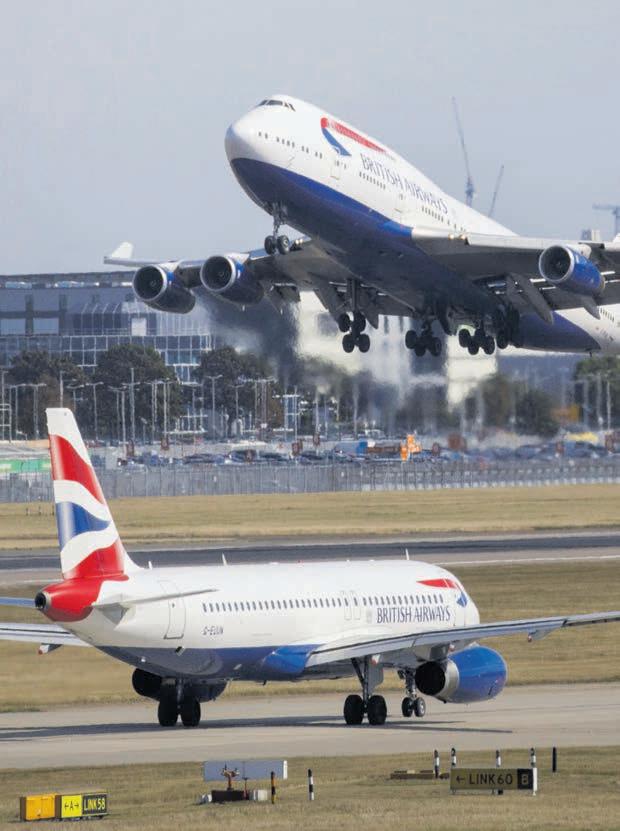
Staff at Terminal 5, BA’s Heathrow hub, will walk out the week before Easter and remain off through the four-day weekend.
BA said they “regrettably had to make a small number of adjustments
to our schedule” while the airport said it had brought in contingency plans, though warned passengers it may take a “little longer than usual to get through security”. Around 300 flights have been affected.
The airport has been hit by industrial action over recent months, which has itself followed chaotic scenes at the Hounslow hub due to staffing levels failing to keep up with rebounding passenger demand.
Office space: Deutsche’s London base sold off as investors bet big on City market

JAMES SILVER
A MALAYSIAN property fund has teamed up with London-based Castleforge to buy Deutsche Bank’s current London base in Moorgate for just over a quarter of a billion pounds –in what amounts to a big bet on the capital’s commercial property market.

Castleforge and its Malaysian partner Gamuda plan to refurbish and upgrade the building –which is due to be vacated by the German bank next year –to provide a “bestin-class, top-rated, environmentally sustainable ESG office space catering to... financial institutions, legal firms and mega-tech corporations”.
Gamuda said they then plan to
sell the building no later than five years after, having locked in “quality tenants”.
The plans include bumping up the building from an existing eight storeys to eleven.
Deutsche is leaving the building, which had been owned by an


English property partnership, for a new UK headquarters atop Moorgate station.
Last night, Antony Antoniou, chief executive of real estate agency and investment specialists
Robert Irving Burns, told City A.M. that
London remained “the ‘go-to’ place to invest” in Europe.
“While the office market has not been immune to the wider downturns, there is a real flight to quality in the sector, and those buildings with state of the art sustainable features or capable of being upgraded are most in demand,” he said.
WELL, you can’t say he laboured the point.
Andrew Bailey limited his commentary on the banking crisis/gentle banking wobble to just one paragraph in his speech last night at the London School of Economics, but he made himself clear enough: further rate hikes are on the way unless something dramatic changes in the UK banking sector. The logic, to his credit, is difficult to argue with. The Bank of
England and politicians have been at pains to say over recent weeks that the UK’s banking system is robust; Bailey’s folksy phrase is that they are “safe and sound”. The combination of guardrails put in place after the financial crisis and the fact that
no UK bank has been quite as badly run as Credit Suisse in recent years has served us all well. There were calls for Bailey and his colleagues on the Monetary Policy Committee to press pause on interest rate hikes to assuage concerns about the effect of rapid rate hikes on the banking sector. They were right not to; there are very compelling reasons not to keep hiking interest rates, but a jittery market is not one of them. It would have indicated to any
observer with a healthy dose of cynicism that the Bank knew more than it was letting on. Last night’s confirmation helps to set City expectations, which Threadneedle Street has finally clocked is a better idea than the will-they-won’t-they guessing games of 2021. But, as is pointed out elsewhere in this paper, the real issue might not be rates, but whether banks keep lending. It stands to reason that if there is still nervousness in
ISRAEL PROTESTS Israeli Prime Minister Benjamin Netanyahu last night delayed controversial plans to overhaul the justice system following two days of mass protests

CONTINUED FROM PAGE 1
There were further signs that any contagion in the banking market was limited yesterday when the US arm of Silicon Valley Bank was purchased by former rival First Citizens after what US regulators described as a competitive process. Shares in First Citizens surged up as much as 50 per cent on news of the deal.
With bankers and investors alike beginning to breathe a little easier, attention turned to what may come next.
Banking expert John Vickers reiterated his warning that the government
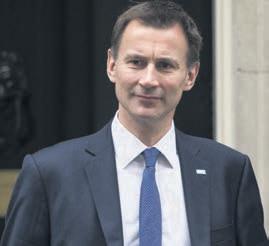
should not relax regulations on the financial sector at a time when banks are already facing severe pressure.
Vickers, former chair of the independent commission on banking, said “current events should put an end to any thoughts of rolling things back”, referring to the government’s proposed Edinburgh reforms.
The Edinburgh reforms, announced by the government in December last year, are designed to “unlock investment
and turbocharge growth” by repealing “burdensome pieces of retained EU law”.

The proposals include relaxing ring-fencing rules –which separates a bank’s riskier operations from its retail division –and scrapping the bonus cap.
Vickers’ calls are likely to be rebuffed by Chancellor Jeremy Hunt, who told a parliamentary committee last week that “sticking with the status quo is not necessarily the best thing to do to maintain stability”.
the system, lending will come in. That’s bad news for the real economy, obviously, and not ideal for investors either. Andrew Bailey’s speech yesterday –15,000 words of perfectly interesting economic pontificating with one rather important paragraph at the end –will not be the last the governor is to say on the state of our banking system. He promised to address it in another speech. That will be a test of the Bank’s new communications strategy.
The global economy’s potential growth through the end of the decade has slowed to the weakest in 30 years, the World Bank said, citing fallout from the Covid-19 pandemic and war in Ukraine.
THE GUARDIAN ROYAL MAIL BOSSES THREATEN TO DECLARE INSOLVENCY
Talks between Royal Mail and the CWU are on the brink of collapse, with the firm’s board thought to have threatened to put the postal service into a form of administration if a deal cannot be agreed.
THE FINANCIAL TIMES
GENERATIVE AI SET TO AFFECT 300M JOBS IN THE US AND EUROPE
The latest breakthroughs in artificial intelligence could lead to the automation of a quarter of the work done in the US and eurozone, according to research by Goldman Sachs.
CITY A.M. REPORTER
CHINA’s full reopening after the Covid-19 pandemic has not led to a sudden boom in the national economy as many had expected, the head of Danish shipping giant AP Moller-Maersk said yesterday.
“When we started the year there was this hope that as China reopens after Covid we would see a really strong rebound,” the firm’s new chief executive Vencent Clerc told the Financial Times. “I think we have not seen it yet,” he said.
“The Chinese consumer is a bit
more stunned by what’s happened and is not in a splurging mood right now.
“This is not quite the ‘roaring ‘20s’type mood that one could have expected after this long interruption,” Clerc said. But, he said trade flowing in and out of China remained resilient and was, for now, unaffected by the ongoing geopolitical tensions with the US.
The comments come after China set a lower annual growth target of five per cent. The IMF predicts it will grow 5.2 per cent this year.

LOUIS GOSS

TRADE unions have hit out at the UK government over its decision to let the company that owns P&O Ferries run the new Thames Freeport development –after the Dubai-owned shipping company “chose” to break the law by firing nearly 800 staff last year.
TUC general secretary Paul Nowak slammed the government’s “appalling decision” to award DP World a contract to co-run the Thames Freeport in Essex as he hit out at the firm for overseeing the “brutal – and illegal – sacking of 800 workers at P&O Ferries”.
Nowak instead said “ministers should have stripped the company of all its public contracts and severed commercial





ties” as he argued the UK’s decision to “reward DP World with another bumper deal” gives a “green light to other rogue employers to act with impunity”.


P&O Ferries admitted breaking the law in March 2022 after firing 786 staff via a pre-recorded video and replacing them with lower paid agency workers.
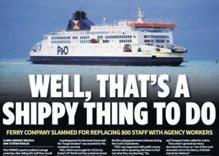

Maritime trade union and body Nautilus’ general secretary Mark Dickinson said the union is “disappointed by the UK government’s decision to award a major public contract to DP World,” as he argued the government has “failed to hold DP World accountable.”
The comments come after the UK government signed off plans to invest up to £25m into developing the Thames Freeport in Essex last week.
Partners has tabled a bid for Cineworld’s Israeli and Eastern European operations, vying with rival bidder, prominent activist investor Elliott Management, for the assets of the bruised chain.

CHARLIE CONCHIE
THE CHIEF of crypto exchange Binance was sued by a US regulator yesterday over a series of alleged trading rule violations, including helping customers evade its own compliance controls.
The Commodity Futures Trading Commission has accused Binance and its chief Changpeng Zhao, known as
‘CZ’, of multiple breaches of the commodity exchange act, including failing to properly register with the watchdog.





























The civil complaint also targets the firm’s former chief compliance officer Samuel Lim, accusing him of “aiding and abetting” Binance’s violations.
The move has the potential to cause major disruption for the US operations of the world’s biggest crypto exchange.
Harbour Energy has been given the go-ahead to develop a new gas field in the North Sea, despite previously warning investors of its plans to pivot from UK markets. Harbour aims to begin development drilling at the Talbot gas field, located 173 miles off the coast of Scotland, this spring, according to previously submitted documents ahead of its approval today. The activity comes despite the energy group previously announcing plans to shift its resources overseas, after reporting a £1.3bn hit from the UK windfall tax.

British Gas, Scottish Power and Ovo Energy were responsible for over 70 per cent of the near 100,000 forced installations of prepayment meters last year, new figures from the Department for Energy Security and Net Zero reveal. DESNZ secretary Grant Shapps has condemned the figures as a “clear and horrifying picture of just how widespread” the controversial practice had become. It comes after British Gas recently hit the headlines over reports its third party operators were breaking into people’s homes and installing meters without properly assessing whether customers were classed as vulnerable. Ofgem has now suspended court applications for prepayment meter installations under a new code of practice is agreed.

SHOP price inflation is yet to reach its “peak” as the rising cost of sugar and high manufacturing costs present a double whammy ahead of crucial Easter trade, a leading retail body has warned.
The British Retail Consortium (BRC) shop price index showed annual inflation accelerated to 8.9 per cent in March, up from 8.4 per cent in February –a fresh high for shoppers who have had no relief from soaring living costs.
Food inflation also continued to skyrocket in March, rising to 15 per cent from 14.5 per cent in February –the highest rate on record.
Meanwhile, fruit and vegetable supply shortages due to bad weather in southern Europe and northern Africa saw the rise in fresh food prices reach 17 per cent, up from 16.3 per cent in February.
“Shop price inflation has yet to peak. As Easter approaches, the rising cost of sugar coupled with high manufacturing costs left some customers with a sour taste, as price rises for chocolate, sweets and fizzy drinks increased in March,” said Helen Dickinson OBE, chief executive of the BRC.

“Fruit and vegetable prices also rose as poor harvests in Europe and North Africa worsened availability, and imports became more expensive due to the weakening pound,” she added.
The cost of goods in stores have been on a steady increase due to a hike in energy costs, shortages of goods and the impact of Covid-19, with consumers bearing the brunt of this fallout.
“Inflation continues to have an impact on the spending power of shoppers and increased energy bills from April will add more pressure,” Mike Watkins, head of retailer and business and insight, NielsenIQ, said.
BURRITO chain Tortilla yesterday revealed it swung to a loss last year as it came under pressure from “unprecedented” food and energy costs. However, record-high revenues of £58m, helped by 18 new UK restaurant openings, saw shares edge up 2.5 per cent.

Belvoir shares bumped up six per cent yesterday after the London-listed property firm’s annual results showed it had managed to weather the mini budget interest rate storm with only a small dip in profit. While Belvoir reported a two per cent pre-tax profit dip to £9.1m, down from £9.3m last year, revenues came in 14 per cent higher at £33.7m, bolstered by two acquisitions. Belvoir chief Dorian Gonsalves said that the fallout from the disastrous mini budget created “significant uncertainty, knocking house sales. Gonsalves, however, said the group remained “confident” looking ahead.
The government must be more “decisive and consistent” in its approach to renewables, or risk missing its net zero goals, a policy expert for the UK’s leading clean energy bodies has warned. Laurie Heyworth, policy analyst for emerging technology at Renewable UK, told City A.M. the government’s erratic policy decisions were undermining the UK’s investment climate. “The Budget last week was pretty disappointing. There still isn’t a strong policy position the UK has taken in response to the US IRA or to REPowerEU,” he said. It comes as the UK prepares to outline its own proposals to boost investment in renewable energy on Thursday.




THE CHAIR of the Saudi National Bank (SNB) stepped down yesterday just a fortnight after a clumsy media interview led in part to the collapse of Credit Suisse –in which the Middle East operator was the largest shareholder.
SNB said in a statement that Ammar Al Khudairy (pictured) had resigned for “personal reasons” and the current chief executive will take over as chair of the lender.

The Saudi National Bank became Credit Suisse’s largest shareholder in October last year after acquiring a 9.9 per cent stake for $1.5bn.
But with markets jittery two weeks ago, Al Khu-
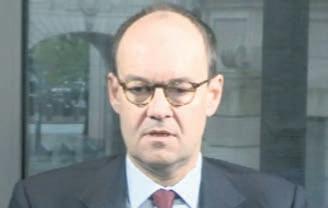





























dairy said the bank would “absolutely not” provide any more capital to Credit Suisse, for “many reasons” as well as the regulatory obligations that would come with a 10 per cent stake.
Following the interview, investors in the bank took fright, fearing that it might run out of cash, leading to a 30 per cent fall in the bank’s share price on the day.

By the end of the week, Credit Suisse’s 167-year history as an independent entity came to an abrupt end when it was acquired by UBS for $3bn.
As a result, SNB faces a $1.2bn loss on its investment, although the bank has said this loss would not affect its invest-

Few will forget Gerald Ratner’s appearance at the 1991 Institute of Directors’ conference. He famously described the products on sale at his jewellery shops as ‘total crap’ –and saw the firm’s value sink by around £500m, before being fired the year after.
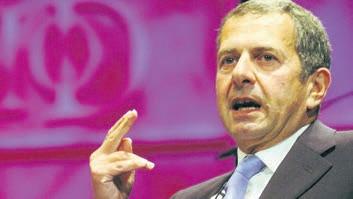
ment plans. The investment represented just 2.2 per cent of its total investment portfolio.


Discussing the initial investment with the Financial Times last December, Al Khudairy said: “we write cheques of that size frequently, I can assure you. This is just another cheque of that size.”
“When was the last time the system allowed for such a venerable global brand to simply keel over?” he said. “That’s what it’s going to take for us to lose significant money.”

Financial institutions from the Middle East have been taking a more prominent role in global banks recently – often backed by national sovereign wealth funds.










SNB’s biggest shareholder is the Saudi Public Investment Fund, which is controlled by Crown Prince Mohammed bin Salman.
The then-BP boss Tony Hayward famously told a reporter “I want my life back” while attempting to apologise for the Deepwater Horizon spill and the resulting environmental catastrophe. The backlash was immediate: President Obama, no less, said he should be fired. Two months later, he was out of the job.
Mike Coupe, thenSainsbury’s boss, had a day to forget when he was caught singing ‘we’re in the money’ while waiting for a TV interview. The merger with Asda he was on the box to talk about fell apart after the competition watchdog stepped in. Coupe is now chair of New Look.
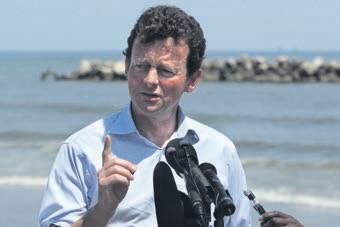
ELENA

SOCIAL housing tenants are waiting 12 months or more for the ombudsman to deal with complaints of unsafe conditions, despite a government campaign to speed up the process.
Earlier this year, Michael Gove, the Housing Secretary, launched the “Make it Right” advertising campaign, directing people to complain to the housing ombudsman if landlords ignored repairs.

Previously, tenants first had to make a complaint to their local MP or councillor and wait eight weeks before escalating the matter.
But the changes, which came into force in October last year, have caused more delays for tenants.
One tenant, who wanted to remain anonymous, made numerous complaints on behalf of a disabled neighbour, who, he says, was living in
unsuitable conditions in March last year. A year later, after the new powers came into effect, his case was yet to be allocated to an investigator.
An email seen by City A.M. from the ombudsman said: “Unfortunately, due to the increased volume of cases being handled by the ombudsman, we are experiencing delays in allocating cases.”
The body said it was going through an “intensive recruitment drive”, to deal with backlogs.


The ombudsman was granted the ability to charge higher subscription fees, which private housing providers pay, but were given no extra resources.
The Department of Levelling Up, Housing and Communities said they were confident in their resources.
A body spokesperson also acknowledged the delays, but said: “In 2021/22, the Housing Ombudsman’s average time to determine a case was 4.6 months.”
Amazon is likely to have to answer UK drivers’ case which is asking that they are treated as full-time members of staff
LOUIS GOSS
AMAZON will be forced to face an employment lawsuit in the UK, a judge ruled yesterday, after the company failed to dismiss the claim.
More than 2,000 of its UK delivery drivers are suing the company demanding that they be classed as fully-fledged staff instead of contractors.
The company’s delivery drivers currently work on a self-employed basis, through third-party ‘delivery service partners,’ meaning they are not entitled to workers’ benefits such as sick pay. Drivers are paid per delivery.
They say the extent to which Amazon has control over their workflow means they should be given employee rights.
Amazon attempted to get the UK employment tribunal case thrown out on the grounds that it had no reasonable chance of success, but the judge said he did not have sufficient information to make that judgment. The case is being brought by lawyers at Leigh Day. Amazon said they were committed to ensuring their drivers were treated with “respect” by the delivery partners.

MATALAN has drafted in a pair of former Lidl and Co-op executives as the bruised value retailer looks to rebuild its performance following the exit of founder John Hargreaves (pictured) earlier this year.
Jo Whitfield, the former chief of the Coop’s food division, will take the lead as Matalan’s chief executive. She will replace interim chief Nigel Oddy.
The supermarket veteran also spent time at Asda, leading its general merchandise business and serving as vice president for operations, e-com and international at Asda’s fashion arm George.


The Liverpool-headquartered retailer, which was rescued by a debt-for-equity swap with its lenders in January, has also brought in former Lidl chief KarlHeinz Holland as the company’s new chair.
Holland spent over two decades at the budget grocer before taking on a chairman role at
CITI’s head of UK investment banking Andrew Truscott has been appointed chief executive officer of John Laing Group.
European value retailer Takko Fashion.
“Anyone close to the retail world will know the experience and focus that both Karl-Heinz and Jo will bring to their roles,” Michael Phelps, partner at Tresidor Investment Management, one of the anchor investors in Matalan, said.
The onboarding of two very experienced retail figures comes after it was speculated that founder John Hargreaves believed that a refinancing deal which pushed him out of the company would leave Matalan in the “hands of inexperienced owners”.

Earlier this year, a swarm of institutional investors including Invesco, Man GLG and Tresidor Investment Management agreed to close a £257m debt-for-equity swap and inject up to £100m of new capital into the business. The move was a source of contention for Hargreaves, who made a failed attempt to swoop in and make a 50:50 deal with investors
Elliot Advisors.
John Laing, which is backed by private equity firm KKR, is an investor and manager of core infrastructure assets.
Truscott has been at Citi since
LAURA MCGUIRE
LUXURY brands are yet to feel the cold wind of recession, with luxury names including Aston Martin, Lamborghini, Bentley and Dior all posting a surge in revenues in 2023.
The companies all cite the “resilience” of their customers in an otherwise tough economic market.
Lamborghini is the latest to appear to shrug off soaring inflation rates and supply chain issues. The Italian carmaker posted a turnover of €2bn (£1.7bn) and reported sales of 9,000

vehicles last year.
Paolo Poma, the managing director and chief financial officer of Lamborghini, said: “2022 was our best year ever on all financial and business fronts. It means we can take an optimistic outlook on the growth of our brand and our company.”
Myron Jobson, senior personal finance analyst at Interactive Investor, told City A.M. “brands like Lamborghini have benefitted from the resilience of their wealthy customers against the cost of living crisis”, with such firms more easily able to pass on rising costs.
2018, and will join John Laing in early summer. Before joining Citi he spent 15 years at JP Morgan focusing on infrastructure and industrial services markets. He became head of Europe at the JP Morgan
Truscott: heading to John Laing Group
Infrastructure Investments Fund in Tara Davies, co-head of European Infrastructure at KKR, said: “Andrew’s strengths as a leader, investor and originator of new business” together with an extensive network in the sector would prove “invaluable”.
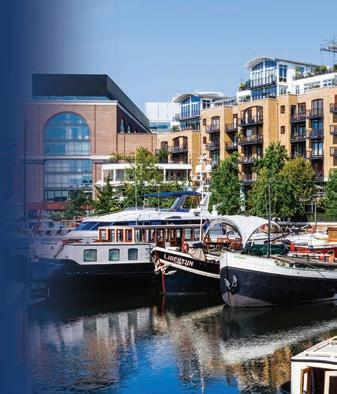 JAMES SILVER
JAMES SILVER
DEMAND for the most expensive housing in London slipped back at the start of the year due to wider economic uncertainty, according to new data.
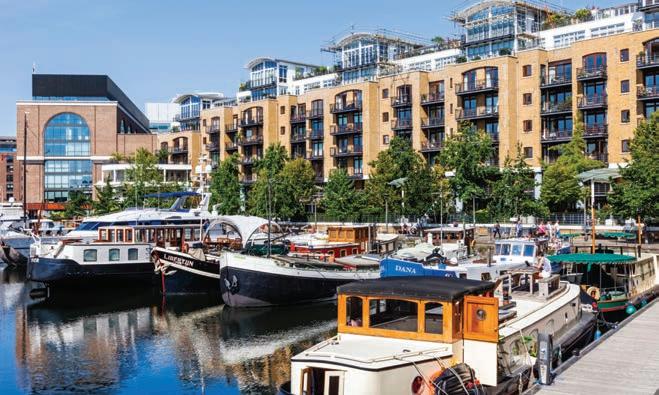
An index which crunches the number of available properties with the amount of offers has seen demand fall slightly for properties in the £2-10m range.
And it has also lagged when it comes to so-called super-prime properties, costing more than £10m, per the analysis from lettings and sales agent Benham and Reeves.
There was significant uptick in demand in Wapping, Islington and Richmond, though traditional hotspots like Highgate and Fulham fell back.
The top end of the market has however been buoyed by the return of foreign buyers to the marketplace, with the end of Covid-19 restrictions and a weaker pound creating a golden opportunity for househunters from abroad.
Benham and Reeves director Marc von Grundherr said he expected the fall to be a temporary blip, with overall de-
mand still up year-on-year.
“It’s clear that the current uncertainty of the UK’s economic landscape is enough to unsettle even the wealthiest of buyers and this has led to a reduction in demand since the final quarter of last year,” he said.

In the wider market, analysts are still predicting a crash, though early forecasts of an almost double-figure percentage fall in house prices appear to be overdone.
There had been fears that higher interest rates could trigger both increased defaults as well as cool demand in a famously overheated market.
However last month’s Rightmove price index saw the average property coming to market increase by £3,000.
“While higher mortgage rates and economic headwinds raise challenges, many potential home movers who were effectively sidelined in the frenetic bidding wars of the last two years will find that a slower-paced market gives them time to plan and secure their next move as we enter the traditionally busy spring-buying season,” Rightmove’s Tim Bannister said.

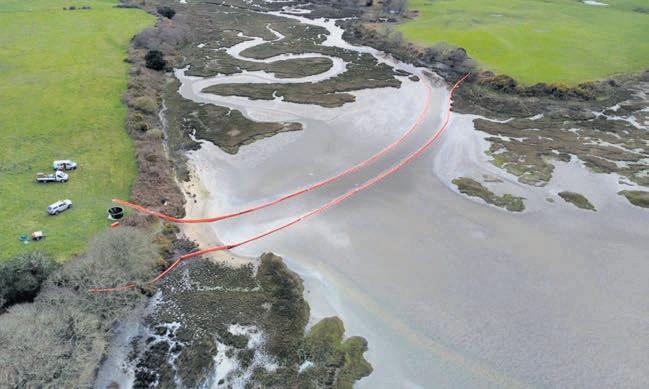

NICHOLAS EARL
SEVERFIELD has posted a bullish trading update ahead of its full year results, revealing a record order book for projects in the UK and Europe.

The structural steel group, which built the new stands at Lord’s cricket ground and has supplied steel for Everton Football Club’s new stadium, ramped up its domestic order book to £508m by the start of March this year, including £391m for delivery over the
next 12 months. This is a huge boost on last November, when the order book was sitting at £464m.


Last November, the company posted record half-year results powered by soaring steel prices.
The company also confirmed it is due to wrap up its £21m takeover of Dutch steelwork contractor Voortman Steel Construction Holding next week, and that it had bought more land in India as part of its expansion plans across its production facilities.
“not as bad as initially thought” says local bossA 200-barrel spill of reservoir fluid - an oil and water mix - has only “two clusters” remaining, according to commissioners at Poole Harbour. The Sunday spill has nonetheless put local wildlife at risk and though not as bad as feared, charities are still on site.

































BANK of England boss Andrew Bailey has warned firms against rising prices to offset inflation. He told the BBC, “please understand if we get inflation embedded, interest rates will have to go up further and higher inflation really benefits nobody”.
The latest UK inflation rate for February surprised economists by picking up again to 10.4 per cent, snapping three straight monthly declines. Restaurants and hotel prices rose by 12.1 per cent, while food and non-alcoholic drinks prices rose by 18.2 per cent, the worst inflation rate since August 1977. This has stoked concerns about accelerating price pressures and falling real wage growth. The official Treasury watchdog said the UK is facing the “biggest squeeze on living standards we’ve faced in this country on record”.
In response, the Bank of England pushed ahead with another rate rise, lifting the bank rate by 25 basis points to 4.25 per cent, the eleventh straight hike. The central bank followed European and US equivalents with another round of monetary tightening, focusing on


the inflation backdrop rather than the potential deflationary fallout from the banking turmoil.
Over the last week, a number of businesses in the UK have warned that prices must go up as they desperately try to protect their margins by passing on additional cost pressures to consumers. Tim Martin, the chairman and founder of pub chain JD Wetherspoon, said “it’s very difficult for pub companies to avoid price rises, and it might produce catastrophic results if Mr Bailey’s advice was taken too literally”. Fever-tree is increasing prices as the tonic and mixers company grapples with the rising cost of glass bottles, energy and commodities. Similarly CocaCola HBC, Unilever and others have also been hiking prices. The worry is that translating higher costs into higher prices could make inflation a long-term characteristic of the UK economy, damaging living standards. On the other hand, if firms cannot try to preserve margins by passing on costs, profitability becomes a struggle putting more businesses and jobs at risk.
Ocado is the worst performing stock on the FTSE 100 over the past year. In February, it reported a full-year pre-tax loss of £501m, missing analysts’ expectations. Its joint venture with Marks & Spencer swung to a loss of £4m versus earnings of £150.4m yearon-year. In 2023, shares in Ocado are down by more than 30 per cent as the pandemic-era boom in e-commerce fades and shoppers return to physical stores. The cost of living crisis is also biting as customers switch to cheaper value ranges. Look out for their first quarter update this morning.
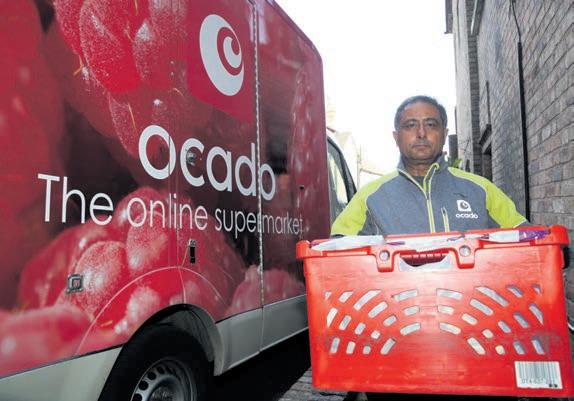
£ Alibaba’s founder Jack Ma has reportedly visited a school in Hangzhou. According to the South China Morning Post, he has returned to mainland China after years abroad. In 2020, Ma criticised China’s financial regulators and banks. His mega IPO of fintech company Ant Financial, which could have been the world’s largest public listing, was suspended in November 2020 kicking off a regulatory crackdown. Ma has largely disappeared from public since.
£ Twitter has lost more than $20bn in value since Elon Musk’s takeover six months ago. The site is now understood to be worth less than $20bn, under half the $44bn price tag the billionaire paid for the company in October. This is according to a leaked memo from Musk that he sent to company staff. Since the takeover, Twitter has had a tumultuous time with headcount slashed from 7,500 to around 2,000 employees while hundreds of top advertisers have abandoned the platform.
Bank of England governor Andrew Bailey commenting on the recent turmoil in the banking sector
Ted Lasso has finally returned to our screens on Apple TV for series three. Amid the backdrop of a cost of living crisis, banking turmoil and geopolitical tensions, this comedy drama provides a wonderful dose of escapism as an antidote to the chaos of reality. Ted Lasso is an American college football coach who is brought to the UK to manage the English football side AFC Richmond. In the latest series, the club has been promoted back to the Premier League, but pundits expect the team to finish last. ‘Wonder kid’ coach Nathan Shelley has jumped ship to go to manage West Ham. There is a fierce rivalry between the two sides as West Ham has been bought by Richmond owner Rebecca Welton’s unpleasant exhusband Rupert Mannion.

Where interesting people say interesting things. Today, it’s Victoria Scholar, head of investment at Interactive Investor
I don’t think it’s a repeat of 2008 at all
HUMZA Yousaf has been selected as leader of the Scottish National Party (SNP) after an acrimonious race to succeed Nicola Sturgeon as first minister.
Yousaf, the SNP’s health secretary, 37, yesterday won against rival Kate Forbes, 32, in the second round of voting, after no candidate reached a majority in the first round.
He secured 26,032 ballots, a 52.1 per cent vote share, to her 23,890 votes, or 47.9 per cent, the party confirmed yesterday.
Yousaf is set to become Scotland’s youngest ever first minister, first Muslim leader and also the first ever person from a minority ethnic background to lead the Scottish government.
But he has faced criticism for his management of Scotland’s health service with one top doctor warning the NHS is in “dire” straits.
Yousaf received 24,336 votes, or 48.2 per cent, in the first round while Forbes

reached 20,559, or 40.7 per cent.

Both candidates were trailed by outsider Ash Regan, 49, who was eliminated in the first round with 5,599 votes, or 11.1 per cent.
Thanking his fellow candidates, the new party leader said: “I feel like the luckiest man in the world to be standing here as leader of the SNP. A party I joined almost 20 years ago and that I love so dearly.”
Sturgeon welcomed the result, writing on Twitter: “I pay tribute to all three can-
Rivals scrapped bitterly over their records and castigated each other’s positions, as they fought to take up a dying cause.
Brian Cox’s involvement aside, this isn’t about the new series of Succession –but another bruising round of infighting and power plays.
The SNP’s campaign for Scottish independence has emerged battered and bloodied following a disastrous leadership contest. Labour and the Conservatives alike are gleeful at the prospect of territory formerly written off now back up for grabs.
On the SNP’s central question, Scots’ support for independence remains
lukewarm. Campaigning has failed to shift the dial, with backing sitting stubbornly at 46 per cent, unchanged since late February, according to YouGov polling. Why?
Humza Yousaf’s election as the UK’s first Muslim leader of a (for now) major party and a devolved government should rightly be lauded as a milestone moment for British politics. But the contest itself has hardly been inspiring stuff, and neither the victor or his rivals have covered themselves in glory.
Yousaf’s finest head-in-hands
moment came when he jokingly asked a group of Ukrainian refugees “where are all the men?” Toe-curling indeed… Arguably, leadership elections are always a time when dividing lines are most exposed. But the SNP is beginning to appear increasingly backed into a corner.
From a police investigation into its finances to the resignation of Sturgeon’s husband Peter Murrell as chief executive, it’s fighting on many fronts –and seems to be winning few of them. It’s hard not to see that the real losers in this succession battle are Scotland’s voters.
JESSICA FRANK-KEYESdidates for the SNP leadership for rising to the challenge.
“I congratulate Humza Yousaf and wish him every success. He will be an outstanding leader.”
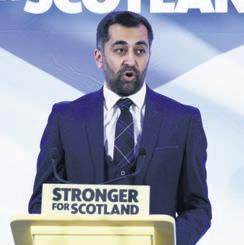
Yousaf, finance minister Forbes and former community safety minister Regan have closely vied for the top job since Sturgeon’s unexpected resignation last month.
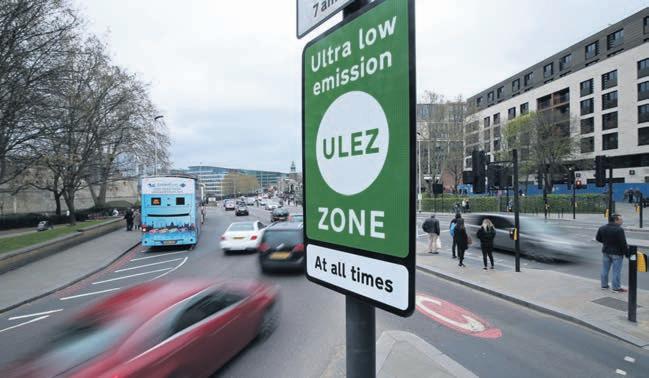
JESSICA FRANK-KEYES
THE WORLD should prepare for a “second front” to open up in the war in Ukraine as Vladimir Putin moves to store nuclear weapons in Belarus, Ukraine has warned.
Russia’s President claimed he agreed with Belarusian leader Aleksandr Lukashenko to station tactical nuclear warheads on its territory.
Ukraine has accused the Kremlin of “nuclear blackmail” and demanded an
UN security council emergency meeting.
Ukrainian politician David Arakhamia warned the world to “be prepared” and said his nation is anticipating a “second front” emerging along the border with Belarus to the north. “We will need at least eight more brigades to control this front line,” he told Sky News.
If Russia moves nuclear weapons into Belarus, it will be the first time it has stored warheads on foreign soil since 1996, when its arsenal returned home after the Soviet Union break-up.
PRINCIPAL SPONSOR
JOIN US ON MARCH 30TH 2023 AT GUILDHALL FOR THE CITY OF LONDON’S HOTTEST FUNDRAISING EVENT


Hosted by the L ord Mayor of the City of L ondon, bringing together influential leaders from organisations across the City of L ondon and beyond Funds raised on the day helps veterans make a successful transition into employment.
OUR AMAZING SILENT AUCTION
Bid on one of our 65 prizes on our website. Prizes include:

Two Wimbledon Centre Court Tickets





Afternoon Tea at The Goring
Home Barista Training Session
Tour and Tea at Westminster Abbey
RAF Corporate Rifle Shoot day
Private Tour of the Old Bailey
Two Return tickets from London Heathrow to Mauritius ... and many, many more!
TO FIND OUT MORE
We still have a few tickets left for the 2pm sitting! Go to out website to find out more.
www.soldierscharity.org/lordmayors


Tel: 0207 811 3202
Email: lmbc@soldierscharity.org
SUPPORTING ALL MEMBERS OF HIS MAJESTY’S ARMED FORCES
THERE’s been reams and reams of wild predictions about whether we’re slipping into another financial crisis, triggered by the collapse of US tech lender Silicon Valley Bank (SVB) and Credit Suisse’s arranged marriage with its crosstown rival UBS.
Blackrock chief Larry Fink even warned in his annual letter to shareholders we’re slipping into a slow burning financial meltdown. Crikey.
It’s tough to know what happens next. When Lehman Brothers failed, there was a couple weeks of calm in markets. Then, as we remember, everything exploded.
Last week, European banks clawed back some of their losses, then dropped hard. Debt markets were choppy. US regional banks sank. The tea leaves are sending mixed messages.
Now, the underlying dynamics that led to SVB and Credit Suisse’s failures are different from those that took down Lehman.
SVB did what every bank does: borrowed short and lent long, but on a herculean scale. By piling cash into US government debt, it exposed itself to what financial gurus call “duration risk”.
Once customers came knocking for their cash, the assets SVB held to meet those demands couldn’t be sold off quickly enough and even if they were, their price had plummeted. Its demise had nothing to do with the credit worthiness of its customers. Poor risk management was the poison.
Credit Suisse was the victim of a confidence spiral. It’s looked shaky for years and was the obvious target for investors to punish.

So, crisis or one-offs? Examining the profile of the banking sector as a whole indicates the risk of another financial meltdown is slim.
Rules put in place after 2008 have tightened lending standards.

That has pushed down the share of people who would struggle to repay their debts if rates
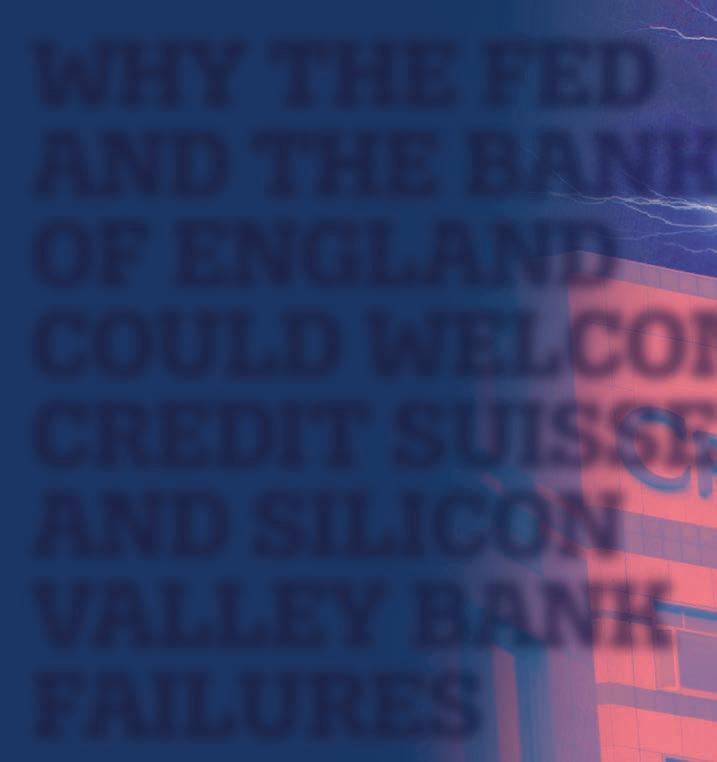


The PLANNING ACTS and the Orders and Regulations made thereunder This notice gives details of applications registered by the Department of The Built Environment Code: FULL/FULMAJ/FULEIA/FULLR3 – Planning Permission; LBC – Listed Building Consent; TPO – Tree Preservation Order; OUTL – Outline Planning Permission Retail Unit, 103 Cannon Street, London, EC4N 5AG 23/00167/LBC
Installation and display of three internally illuminated signages and one non-illuminated signage.
37 Fleet Street, London, EC4Y 1BT 23/00192/LBC
London, EC1A 9DW 23/00196/FULL
London Metropolitan University, 84 Moorgate, London, EC2M 6SQ 23/00218/LBC

126 Andrewes House, Barbican, London, EC2Y 8AY 23/00228/LBC
71 Fenchurch Street, London, EC3M 4BR 23/00239/LBC
safety.
7 Newgate Street, London, EC1A 7NX 23/00268/FULL
of a door opening and ramp on the southern
St Mary-At-Hill Church, St Mary At Hill, London, EC3R 8EB 23/00271/FULL or telephone 020 7332 1710.
rose suddenly –the “subprime” mortgagors of 2008 –sharply lower.
A big chunk of homeowners in the UK, US and Europe will need to remortgage this year on much higher rates. If the regulatory regime of the last decade or so has worked, then defaults should be limited.
Families now are also much less indebted than they were before 2008, so they have greater capacity to absorb higher mortgage bills.
And the banking sector as a whole is cash rich. Onlookers saw that with Credit Suisse. Yes, holders of the lender’s CoCo bonds can grumble at being duped by Swiss boffins (they were done badly to be fair) using their holdings as a pawn to broker the UBS deal.
But that event illustrates banks have capital readily available to sacrifice if losses emerge.
Let’s park the plumbing of banks and financial markets and focus on what’s coming down the pipeline.
Lots of people are still confused as to why the financial crisis sparked such a long drawn-out recession that the global
economy is still recovering from now.
Ignore stock markets tumbling. They, in the main, have little impact on the real economy. The issue that choked growth was the credit crunch that came after the high-profile bank collapses.
Banks stopped lending to each other.
Money dried up. Families and businesses couldn’t get ahold of capital. Economic activity stalled for years.
That dynamic could unfold in the coming months.
Right now, banking executives will be worried about one thing: being hit by people suddenly pulling their cash.
To prevent being caught with their pants down in such a scenario, they will be drawing up plans to tighten lending standards to retain money within the organisation.
Just like SVB, many lenders are probably concerned about not being able to raise enough cash to cover the demands, strengthening incentives to hunker down.
This makes sense, from their point of view.
If every bank does that, then economies are
Many in the City reckon the Bank is done with interest rate hikes after last Thursday’s eleventh rise in a row to 4.25 per cent. Everyone except Barclays. They bumped their peak rate forecast higher to 4.5 per cent, mainly because underlying inflation is still pretty high. Figures out last week from the ONS showed core inflation jumped.

Chancellor Jeremy Hunt’s widening of childcare support at the budget earlier this month was roundly welcomed by many groups. But there’s a catch: earn £1 over £100,000, and you don’t qualify - so young parents would be better off on £99,000 than £140,000.
in for a bumpy ride.
Businesses that would hire an additional person won’t be able to source the money to do so. Young families with good credit profiles and high deposits won’t be able to buy a house. Scarce credit supply is one of the main factors that tips economies into recession. It is also one of the toughest problems to fix.
There is a silver lining hidden within this scenario (should it play out). Private sector banks would do some of the heavy lifting for the likes of the Federal Reserve, Bank of England and European Central Bank by chilling economic activity.
Fed chair Jerome Powell acknowledged that point in his post-rate decision press conference last week.
It’s worth remembering what central banks are trying to do: sledgehammer households and firms with higher rates to tackle inflation. If household name banks do that for them, then maybe, just maybe, Powell and his counterparts could park some of the blame for the coming economic hardship with somebody else.
City A.M.’s economics editor Jack Barnett takes a deep dive into the state of the economy in his weekly column
WHAT I’M READING
LONDON’s FTSE 100 kicked off the week in upbeat style yesterday, yanked higher by UK banking giants Barclays and Lloyds racking up gains.
The capital’s premier index jumped 0.9 per cent to 7,471.78 points, while the domestically-focused mid-cap FTSE 250 index, which is more aligned with the health of the UK economy, climbed 0.19 per cent to 18,529.62 points.
Yesterday morning’s upward moves should help ease fears about the fragility of the global banking sector that resurfaced at the end of last week and saw German giant Deutsche Bank slump as much as 14 per cent.
Traders over the weekend had been mulling how to reposition at the opening of a new week.
However, lenders that led London’s FTSE 100 and other top European indexes retraced higher yesterday.
Barclays advanced over two per cent while HSBC, Britain’s biggest lender, climbed more than one per cent.

In Germany, Deutsche Bank surged a shade under six per cent, while France’s Societe Generale nudged higher, as did BNP Paribas and Santander in Madrid.

UBS, which absorbed its biggest rival Credit Suisse last week after Swiss authorities pushed through a shotgun sale earlier this month, ended the day higher.
Failed US lender Silicon Valley Bank has found a partial buyer in First Citizens, it was announced yesterday, lifting sentiment toward banks.
“First Citizens will buy most of SVB’s assets, helping to lift sentiment across the banking sector after a rocky end to last week, though the pall of banking stress still hangs over the market. There is a not yet the sense that the market has stopped looking for its next victim,” Neil Wilson, chief market analyst at Finalto, said.



The pound strengthened about 0.3 per cent against the US dollar.
Oil prices ratcheted up around 1.5 per cent.
To appear in Best of the Brokers, email your research to notes@cityam.com
LED maker Dialight is in a good position to benefit from higher energy prices, as customers seek out more efficient forms of lighting, according to analysts at Peel Hunt, who noted the British electronics company’s prospects have been bolstered by a “positive” court decision in its legal battle with Californian rival Sanmina. The analysts said Dialight’s share price is “close to” their target price as they gave the small-cap firm a ‘hold’ rating target of 210p.
The closure of the Iraq-Turkey pipeline, following a ruling by the International Commercial Court, could lead to the temporary shutdown of Gulf Keystone Petroleum’s (GKP’s) Shaikan oilfield in the Kurdistan region of northern Iraq, Peel Hunt’s analysts said, as they warned the ongoing incident will likely have a detrimental impact on investor sentiment and in turn see GKP’s share price suffer. The analysts gave GKP a ‘buy’ rating with a price target of 300p.

TAKING A BREATH “We’re seeing a rise in two-year yields on both sides of the Atlantic as markets price out some of the more dire recession scenarios that were mooted at the end of last week, as markets take a breather.”
MICHAEL HEWSON, CMC MARKETS

REPORTED black mould and it hasn’t been fixed? UNACCEPTABLE” reads the new government’s campaign about social housing complaints. It’s all about giving tenants the ability to quickly and easily make complaints about repairs, maintenance, or health and safety works.
“It’s now easier to make things right”, it says. But is it really?
In October last year, the government removed a step from the process - the so-called democratic filter. Tenants no longer have to first go to their local MP or councillor before contacting the housing ombudsman. Now, tenants can complain first to their landlordthe housing association or the council - and if they’re unhappy with the response they can go directly to the ombudsman.

Instead of making it faster to find a resolution, it has overloaded the ombudsman. An email from the ombudsman to a tenant seen by City A.M. acknowledges they’ve been left waiting for more than 12 months. “I can assure you that these delays are not singular to your case but are being experienced across the board as a result of the increased demand for our Service”, says the email.
The difficulty in getting problems fixed - be they mould or electricity cuts - if you live in social housing has roots more than a decade old. With the “bonfire of the quangos” in 2010, the government replaced the social housing regulator - back then called Tenant Services Authority - with a new one. Its new role was “much more about making social landlords well governed and funded rather than a focus on consumer standards”, says James Prestwich, director of policy and external affairs at the Chartered Institute of Housing. Fast forward thirteen years, and social housing is in a dire statewith many stuck in unsuitable homes. Housing associations might have
deeper pockets, but the shift in priorities was definitely not worth it. Tenants have different complaints, but say they face the same problems: they feel ignored as staff from housing associations arrive late to meetings or are unresponsive, they wait years to get things fixed, or even have to pay to fix them themselves. Is it now easier to “make things right” for them? “It’s simply untrue”, says one tenant. “I have to laugh”, says another.
Several tenants up and down the country have been through multiple complaints processes. They claim they are paying for maintenance services themselves, but can’t afford to take legal action to force their landlord to
reimburse them. And legal action doesn’t always change the timeline. “Some of the social landlords would not respond, or drag it out, or defend their case and that takes another few months”, says Giles Peaker, partner at Anthony Gold Solicitors. “The impact it has on you mentally…It starts to break you”, says a woman who describes her social rented flat in Ealing as “hell since the moment I got there”. The debate on tenants’ Facebook groups is often borderline toxic. The relationship between tenants and social landlords has been almost fatally undermined - with some tenants claiming their housing association spies on them through social media, and hous-
THE recent string of banking failures has been a sobering reminder to everyone that the large banks that dominate the financial world are just one major crisis of confidence away from a severe fallout that can have serious ripple effects across global markets. The shotgun merger of UBS and Credit Suisse earlier this month was the latest, and arguably greatest, in a series of recent events, including the collapse of SVB, that have shaken investor confidence.
Indeed, this is demonstrated by the results of Bank of America’s monthly survey of institutional investors, conducted between the SVB and Credit Suisse failings, that shows investors are holding onto an increased amount of cash. This is always a surefire sign that things aren’t going right in traditional markets – if institutional investors are choosing to hold onto capital with safety in mind, rather than putting it to work.
Whilst the focus has inevitably been
on the balance sheets of banks, what must now be top of investors’ minds is the heightened requirement to have an in-depth understanding of their own risk exposures. I am sure that when the news of UBS and Credit Suisse’s forced union broke, many an investor was thinking “am I exposed to this in any way?”. This is especially relevant when you think of the $17bn in Credit Suisse AT1 bonds that were written off by the Swiss regulators –there are many investors who must have been sat with these bonds on their books, and could have potentially diverted strategy when the walls started tumbling a few weeks ago.
Granted, it wasn’t standard practice for the regulators to pay the shareholders out before those holding debt, but anything can happen when a bank the size of Credit Suisse starts to collapse. This is even more important given the increasingly diversified investing strategies that are carried out now, compared to the last banking crisis of 2008. Investors are likely to be exposed to these banks in more complex ways than previously, be that through very niche bonds, complex and often opaque derivative products, or some other form of credit. It begs the question, who else is sat on exposures and which assets that might be considered safe right now, will be considered extremely risky in two weeks’ time?
When you invest in a wide range of assets, you are often dealing with very different types of data in your internal systems, and having the ability to quickly pull up a very clear and transparent view of all of your holdings isn’t as common as you’d expect. But therein lies a major issue when it
comes to risk management – you need to have a real time understanding of your risk exposures in order to make real time decisions on how best to manage that risk. It is critical to have a single lens across all investments to aid time-pressed strategic investment decision making, to ensure that you are not left behind as the market reacts to the latest leak.
This banking crisis has put risk exposure back to the surface for everyone.
The collapse of a 166 year old, mammoth banking institution has echoes of 2008 about it, but the technology available to investors now is very different. What the events of the last month have re-emphasised is the importance of real time, daily, validated, and reconciled pricing data on investors’ whole portfolios, so that they can properly understand their exposure to what they may have thought last week were rock solid assets.
ing associations’ staff lamenting abuse online. A tenant-landlord relationship based on trust is what made social housing a great public asset during the last century. That relationship has broken.
The government knows it, and is trying to act. The Social Housing Bill, making its way through Parliament, will provide the regulator with additional powers to issue unlimited fines on rogue landlords and make emergency repairs with landlords footing the bill. A spokesperson for the Department of Levelling Up also notes that the ombudsman can now charge increased subscription fees paid by providers to be part of the complaints process. Ultimately, the government’s strategy could be based on a risky bet: they hope that when new regulation comes through, an empowered regulator will be able to force landlords to act before things escalate to the ombudsman. “Tenants don’t want to go through complaints procedures, they want their landlords to act”, says Blase Lambert, chief executive of the Confederation of co-operative housing. Not every landlord is a bad landlord, but recent history taught us many haven’t been taking their duty of care seriously.
The “make things right” campaign is part of a broader effort from Michael Gove to look tough on bad agents in housing. On a political level, it makes sense for a Secretary of State facing down developers over Grenfell cladding. But it makes less sense to people who have been living with mould creeping through their homes, pest invasions that won’t go away and leaks turning their flats into swamps. For them, advertising won’t make their

Jack Ma, the founder of Alibaba, has returned to mainland China in a much touted sign of Beijing’s return to normal after a series of crackdowns on the tech sector. The billionaire visited a school in his hometown of Hangzhou, the same place Alibaba has its HQ
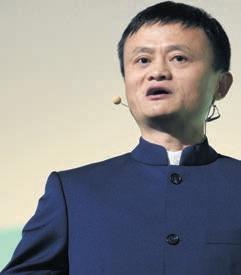 £
£
Colin Clunie is Head of EMEA Operations at Clearwater Analytics
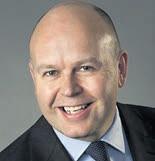

[Re: “Project Yeti”: Inside the scramble to save Silicon Valley Bank UK, March 13]
People trust centralised entities less than ever before. With SVB’s collapse representing America’s 16th largest bank and the largest bank collapse since 2008, the warning signs remain for the rest of the banking industry. Amid the recent news of Credit Suisse being rescued, current trust in centralised entities and the banking system could still decrease significantly.
People may start to take control of their finances individually, moving their
assets into cryptocurrencies and other investment methods - areas they can personally control. The argument that people must truly be able to own the money they have is stronger than ever now. Entrusting it to the hands of a few banks is becoming less of an attractive option.
As the traditional banking sector continues to lick its wounds, Web3 startups – companies that advocate for a decentralised internet rather than one based on centralised platforms - will raise more than ever, and more people will trust Web3 than ever before. In short: the end of SVB could be the start of the next Web3 bull run.
Phil Kwok EasyAA HOTEL BOOM Travelodge hatches a plan for 300 more hotels across the UK

STANDING at the dispatch box earlier this month, the Chancellor pledged his economic plan would deliver “long-term, sustainable, healthy growth” across the UK. It was curious, therefore, that his Red Book contained no mention across its 122 pages of one project that would tick all of those boxes: HS2.
Earlier this year, Jeremy Hunt confirmed the government’s commitment to delivering HS2 and ensuring it runs all the way to Euston. But we now know that the completion date has been pushed back significantly, ostensibly to cut costs.
The sums behind the argument that delaying construction of HS2 will save money simply do not add up. Spending less now will only increase costs over the long-term while delaying the benefits for people and businesses across the country. It also puts jobs in the supply chain, like at Hitachi in Newton Aycliffe, at risk.

In February last year, Will Tanner, then the director of think tank Onward, said the next election would be won on trust on crime. Now Tanner is deputy chief of staff to Rishi Sunak, who just announced plans to crack down on anti-social behaviour. Both parties have pivoted into election mode, and both are going helter-skelter for tackling crime. Under Sunak’s plans, people will be able to have “immediate justice”, with people accused of some crimes, such as graffiti, able to help repair the damage. Last week, Labour leader Keir
Starmer outlined his own plans for crime prevention.
Labour’s lead in the polls for trust on crime has narrowed, from nine points to six. The last time Labour was winning on crime, Tony Blair was about to ascend to power. Circumstances have changed. This time last year, Boris Johnson and Sunak were about to be fined for lockdown rule-breaking.
As Prime Minister Sunak has proved himself an expert in competent, quiet management. If the 16 pilots to stop anti-social behaviour prove fruitful, it would be a windfall for the next election.
The UK has a long history of projects that have been delayed or shelved to save money in the short-term only for them to re-emerge at a later date with a more expensive price tag. Construction costs inevitably go up – especially at a time when inflation is high – so taxpayers will ultimately end up paying more. This assessment has been confirmed by a leaked Department for Transport briefing document which drives a coach and horses– through the idea that a delay will save money. According to this memo, the line to Manchester is two decades away, and there is still no certainty about how to get services to Leeds as promised. Meanwhile, HS2 will terminate outside central London for a similar time frame despite the fact that the area
around Euston looks increasingly like one massive construction site. It is also not clear at all how HS2’s final southern stop for that period – Old Oak Common – and the Elizabeth Line that serves it will cope with this deluge of new HS2 passengers .
These delays would deprive people in the North and London of HS2’s true benefits for a generation. Instead of trimming and stalling the project, we need a laser-like focus on ensuring that people and businesses across the country can seize the opportunities it offers as soon as possible. The alternative is yet another generation with the economy consigned to be stuck behind a stopping service rather than the capacity and growth on a new line.
Political dither and delay comes at a time when the government wants to attract investment into the UK but this decision is instead sending the worst possible signal. Businesses are having to cancel plans, lay-off staff and not get a return on their investment. Why should they believe there won’t be yet more further changes and continue to invest in opportunities around the new stations? Or indeed
why should they invest with confidence on the basis of any infrastructure projects in the UK?
The country needs this project to remain on track through swift and efficient delivery to drive long-term growth and decarbonisation. Slowing down construction of sections will do little to help levelling-up, particularly in the North and parts of London as well.
Growth is the only sustainable way of increasing prosperity, improving public services and ensuring the nation’s finances are on an even keel.
With shovels already in the ground, the UK cannot afford yet another delay. Ministers should lift this handbrake on our economy and instead accelerate delivery of HS2 to create a world-class, new capacity-boosting rail line that will transform connectivity between our major cities, including Glasgow, Manchester, Birmingham and London.
£ Henri Murison is chief executive of the Northern Powerhouse Partnership and John Dickie is chief executive of BusinessLDN

We face yet another generation with the economy consigned to be stuck behind a stopping service
DRIVINGon electric is old news to Lexus customers.
The premium car brand has majored on hybrids for years – cars that, at slower speeds, often switch into electric mode for silent and emissions-free motoring. Today, Lexus scarcely sells a car that isn’t a hybrid.
The RZ is the next step in this journey, occupying the space between the smaller NX and larger RX as Lexus’ first ground-up electric car. It debuts in RZ 450e guise, with a 71.4kWh battery that, impressively, has a 10-year warranty – after which it is expected to retain ‘at least 90 per cent’ of its capacity. Compare that to how exhausted your mobile phone battery is after a couple of years.
There are three versions, with prices starting from £62,600; rivals include
the Audi Q8 e-tron, BMW iX3 and Mercedes-Benz EQC. The Jaguar I-Pace is another alternative, as is the Tesla Model X – if you could actually buy one. As you can’t, Teslarati must make do with the cheaper Model Y.
To Marseille, then, and the exclusive, art-filled Château La Coste. Bono stayed here just before me, apparently, but he took the weather with him and it was far from a beautiful day when I arrived. Still, my RZ certainly stood out in vivid Sonic Copper. As the Instagrammers say, it really ‘popped’. This was a top-spec Takumi model, so it had 20-inch wheels and a contrasting black upper body. I love how the Lexus ‘spindle’ grille is now fully integrated into the front end, while the split roof spoiler looks like it was sculpted in an F1 wind tunnel –really nice touches.
LEXUS RZ
PRICE: FROM £62,600
POWER: 313HP
0-62MPH: 5.3SECS
TOP SPEED: 99MPH

RANGE: UP TO 271 MILES
CO2 EMISSIONS: 0G/KM
The heavily digital interior is dominated by a huge HD touchscreen. Our Takumi test cars had deliciously soft Ultrasuede upholstery, while aspects such as the precise ‘click’ of the electric door latch system feel suitably futuristic. Lexus has built in a richness to its first clean-sheet EV that is absent from many rivals.
We’re used to Lexus cars whirring along in silence, so the RZ doesn’t feel
too different at first. What does stand out is the ongoing quietness; there’s no sudden roar as a four-cylinder hybrid engine kicks in, just a blissful hush.
The RZ’s supple ride also appeals, particularly on the base 18-inch wheels that nobody will buy in the UK. There’s still a good amount of comfort on 20s though, helping the car flow along gnarled road surfaces.
It has two motors and all-wheel drive. With 313hp, it’s quick – 0-62mph takes 5.3 seconds – but it delivers this shove with polite purpose rather than an aggressive surge. And no matter how hard you press your foot to the floor, refinement remains unspoilt. Brilliantly, Lexus has gone electric to enhance its USP.
It’s just a pity about the range. The RZ will travel 3.7 miles for every 1kWh of charge from its 71.4kWh battery: 30
per cent better than all-wheel-drive rivals such as the Q8 e-tron. However, the Audi is offered with a huge 114kWh battery, giving it a range of 330 miles. The Lexus, on 20-inch wheels, can only manage 245 miles. That’s not disastrous, but the RZ also suffers from the issue that befell the closely related Toyota BZ4X. Namely, if you turn on the heater, the indicated range drops by almost 40 percent. This bizarre quirk is being fixed in the Toyota; here’s hoping the same changes are rolled out at Lexus.

Overall, the RZ feels like the most ‘Lexus’ car the company has ever produced. Beautifully refined and luxurious in feel; even alongside premium rivals it offers a relaxed and cosseting experience. It deserves for this haven of serenity not to be shattered by unnecessary range anxiety.



The best looking new car of 2023?
It might only be March, but already we may have a winner. The Roma Spider is Ferrari’s new ‘entrylevel’ convertible, replacing the far less photogenic Portofino M. Powered by a 620hp 3.9-litre V8, it can sprint to 62mph in 3.4 seconds and blowdry your bouffant at 199mph.
Prices haven’t been announced yet, but expect a premium of at least £20,000 over the £170,000 Maranello asks for a Roma coupe. Or north of £200,000 by the time you add a few must-have options.
In contrast to recent al fresco Ferraris, the Roma Spider has a fabric roof, rather than a flip-and-
fold metal affair. The five-layer hood retracts in 13.5 seconds at speeds up to 37mph. Together with extra body bracing and a pop-up wind deflector, it adds 84kg to the Roma’s kerb weight of 1,570kg.
An optional technical fabric gives the roof an ‘extremely striking iridescent red finish’. It stows behind a carbon fibre active spoiler, which produces up to 95kg of downforce at 155mph. Boot space is a superminisized 255 litres with the roof raised.
The Roma Spider retains the coupe’s child-sized ‘+2’ rear seats.
Its twin-turbo V8 – a multiple International Engine of the Year award winner – is also unaltered,
driving the rear wheels via an eight-speed dual-clutch automatic gearbox. The arsenal of chassis tech includes Side Slip Control version 6.0 and the Ferrari Dynamic Enhancer. We drove the coupe at the launch in 2021, and concluded by saying: ‘Aside from a few qualms about the cabin, the Roma really is as good as it looks. It’s both a glamorous GT and a scintillating supercar. If you’re after a Ferrari that ticks every box, all roads lead to Roma’.
For the lucky few, the Roma Spider adds even more style and potential excitement. The proof will be in the driving, but this Ferrari already looks like a winner in more ways than one.
The RZ marks the beginning of a new electric era for Lexus, yet plays to its traditional strengths. Richard Aucock drives it.
CHELSEA say that the UK government’s sanctions on their former owner Roman Abramovich contributed to the club posting losses of more than £120m last year.
The club’s losses of £121m relate to the final months of Abramovich’s ownership before he was forced to sell to a consortium led by Todd Boehly due to his links with Russia and President Vladimir Putin.
“The results for the year have been impacted by the sanctions placed on the club’s previous owner on 10 March 2022,” Chelsea said.

“As a result of the sanctions, the club was required to operate within the limitations of a special licence issued by the UK government.
“These restrictions were in place until the completion of the club’s sale on 30 May 2022.
“During this period, the club was restricted in a number of areas including, but not limited to, its ability to sell matchday and season tickets, sell merchandise, accept event bookings, as well as sign contracts with players and commercial sponsorship partners, which collectively resulted in extraordinary expenses and loss of revenue.”
Despite the losses, Chelsea’s turnover increased by nearly £50m from
£434.9m to £481.3m. Commercial revenue at the London club also increased to £177.1m.
“The higher revenue was offset by increased operating expenses, including matchday and non-matchday costs that resulted from resumed operations and increased staff costs,” the statement added.
“The above contributed to the Group recording a loss before player impairments and one-off expenses of £26.6m for the year ended 30 June 2022, and an overall net loss of £121.3m.” Abramovich was sanctioned in March and completed a sale of the club in May.
FRANK DALLERES
The funds raised from the sale of the club have been earmarked for those affected by the war in Ukraine but still remain frozen.
Chelsea’s next three Premier League games see them host Aston Villa and Liverpool before travelling to Wolves.
Thereafter Graham Potter’s side face Real Madrid in the opening leg of the Champions League quarter-finals in the Spanish capital.
Potter has been under serious pressure from the Stamford Bridge faithful but the side have managed to win three of their last four matches.
MATT HARDY
SCOTLAND full-back Stuart Hogg has announced his surprise retirement from rugby after this year’s 2023 Rugby World Cup.
The 30-year-old is set to leave the game having played for Scotland, the British and Irish Lions and clubs Glasgow Warriors and Exeter Chiefs.

“After RWC2023, my professional rugby journey will end and I will be retiring from the game,” former Scotland captain Hogg said.
“As a young kid growing up in The Borders, all I wanted to do was to play rugby for Scotland.
“I feel privileged to have represented my country on 100 occasions, play on three British and Irish Lions tours and represent some amazing clubs. I couldn’t have asked for any more.
“Knowing what lies ahead, I have a real hunger to play the best, most enjoyable rugby of my career, finishing the season strongly with Exeter Chiefs before attacking the opportunity we, as a nation, have in France.”
Elsewhere, Ireland No10 Johnny Sexton is set to miss the remainder of the domestic season due to a groin injury.
ANTONIO Conte will receive around £4m in severance pay after his departure from Tottenham Hotspur was finalised at the weekend.
The Italian agreed a settlement with the Premier League club at the weekend after his tenure turned increasingly sour this season. Conte’s contract was due to expire this summer so he is only due the remainder of his salary, it is understood. Suggestions that his deal contained a clause assuring him of a £15m pay-off in the event of being fired have been dismissed by sources close to Spurs. The club
are also believed to be saving money because his assistant, Christian Stellini, is staying on as caretaker manager for the rest of the season.
Former Chelsea, Inter Milan, Juventus and Italy coach Conte led Tottenham back into the Champions League in his first season, having taken charge in November 2021. But he failed to build on that platform this term, falling into a fight to stay in the top four and limping out of all knockout competitions.

The final straw came after Conte turned on his players when they squandered a 3-1 lead in a draw with the Premier League’s bottom
CRICKET
club, Southampton, nine days ago. Conte departed on Sunday following a week of speculation over his future with Spurs sitting fourth, albeit having played more games than other teams around them.
“We have 10 Premier League games remaining and we have a fight on our hands for a Champions League place,” said chairman Daniel Levy. “We all need to pull together. Everyone has to step up to ensure the highest possible finish for our club and amazing, loyal supporters.” Conte’s pay-off is a fraction of the £26.6m he and his staff received from Chelsea after he sued for unfair dismissal in 2018.
MATT HARDY
ENGLAND international Jason Roy could receive a payday of £300k if he takes part in Major League Cricket’s (MLC) inaugural season later this year.
The opener, who won the 2019 oneday World Cup with England, has been out of Matthew Mott’s side in recent tours and could cash in on up to $75k (£61k) per match if he bats for a franchise such as the LA Knight Riders. MLC was due to launch last year but was delayed, in part, due to the Covid19 pandemic.
Last week’s draft saw fellow 2019 winner Liam Plunkett selected for the San
Francisco Unicorns while a number of Australians have also been picked up by the six franchises.
The T20 competition is the latest domestic franchise league to hit the world of cricket following this year’s men’s league in South Africa and the first Women’s Premier League in India. MLC will see six teams compete in 19 matches over a three-week period with some of the franchises having Indian and Australian overseas ownership structures.
The Daily Mail, who first reported the story, suggest this could be part of an ongoing battle between England and foreign franchises over players.
I‘M ASTONISHED that Antonio Conte didn’t get the job done at Tottenham Hotspur and am disappointed that he has left the Premier League. But the Italian has to take his fair share of the blame that his time at the club ended prematurely.
In his defence, he only had 16 months in charge and the facts are that he got them into the Champions League and left them in fourth place. There is also no question about his passion for winning. But Spurs did not look like a team playing well, they never became guaranteed Champions League qualifiers and Conte’s approach was undermined by poor performances.

At times it felt like he was trying to hammer square pegs into round holes. He tried to use the 3-4-3 system that won him the title at Chelsea, only without
IT IS A dark irony that football and rugby have never been more concerned with head injury and concussion, yet the approaches of both sports remain dangerously misguided.
In their attempts to prevent the trickle of chronic traumatic encephalopathy (CTE) and early-onset dementia cases becoming a torrent, football has experimented with a ban on heading and rugby with lowering the legal height for tackles.
But both policies are fundamentally flawed, say experts, because they treat concussion as the only danger. Sub-concussive impacts are a bigger risk as they are 500 times more frequent, caused by only a quarter of the force of a concussion and usually asymptomatic.
“Calling for the banning of heading is like stopping the sale of Mars bars and expecting obesity to go away,” says Judith McMinn, who researched the topic while developing the Rezon Halos, a protective headband for playing sport.
“Labelling this as all down to heading is pretty naive. If it were all about heading, why would NFL and rugby players have CTE? It’s sub-concussions from head impacts, however you get them.”
CTE was identified 80 years ago but has only recently been better understood, and the way that it works is still not widely appreciated. One of the key learnings has been that rotational forces are more damaging than linear ones, destroying brain cells and causing bleeding in the brain.
At the same time, current headgear for athletes offers limited protection. Helmets prevent skull fractures and scrum caps limit cuts, scratches and cauliflower ears, but neither protect against sub-concussive impacts and those rotational forces.
“The irony is that we have a crisis of brain injury in rugby and yet the headguard which 60 per cent of people think is protective is in fact not protective at all [against CTE],” she adds.
Sport’s failure to grapple with head injuries has troubled McMinn, a director at the Northumberland County Football Association and formerly of Deloitte and Tony Blair Associates, since her days playing school hockey 25 years ago.
She had a question: “Why are we protecting our teeth and shins but not our brains? I asked a lot of people and no one could tell me the answer.”
So McMinn set about trying to solve it herself. Having spotted a gap in the market, she assembled an international team of experts in brain injury, wearable tech design and manufacturing and set about creating Rezon Halos.
Trevor Steven
the same quality of player. And when results have faltered Conte has often wanted to buy, which is only going to work so often with Spurs chairman
Daniel Levy.
It will be an indication of Conte’s tactical stubbornness if his assistant Christian Stellini changes formation in his spell as caretaker.
The other test of a manager’s success is whether they are making players better, and in that respect Spurs had
started to go backwards. Richarlison has been a headless chicken, Eric Dier has regressed again, and Heung-Min Son looks utterly lost. Everyone has been affected, who when Tottenham play badly they can be woeful. Manager-player relationships are important; teams have to buy into those leading them if they are to have that winning quality of picking up points even when playing poorly. Conte seemed to feel that being tough was the way to instil that mentality, and then became exasperated that too many weren’t hurting enough.
The game that leaps out is the FA Cup fifth round defeat at Sheffield United. Conte rotated his team, assuming his squad would be good enough to topple
a decent Championship side. They weren’t, and it wasn’t long before he was publicly criticising his players’ mentality.
Uncertainty over Conte’s future didn’t help. Players probably sensed that his reluctance to commit stemmed from their performances, which won’t have helped the dressing room mood.
But I go back to that Sheffield United game. Win it and Tottenham are one game from Wembley, two from a cup final but his team selection showed a lack of appreciation for the value of a trophy to Spurs. Conte rolled the dice and lost. Levy is once again searching for a new manager and three men stand out: Julian Nagelsmann, Roberto De
is an
while
would be returning to work for a chairman who sacked him last time, which is never positive.
I’d go for Nagelsmann. His dismissal by Bayern Munich has presented Spurs with an unexpected opportunity to hire a manager full of youth and ideas. I think he’d be interested in moving to England and, unlike Conte, he is unlikely to publicly put pressure on Levy.

marked protective headbands in the UK and Europe in November 2021, since when they have sold thousands of units around the world, and are soon to go on sale in high street shops for the first time, priced £89.
McMinn has other, more personal motivations for her mission to minimise CTE. “My father has dementia,
unrelated to sport, and I have watched how life changing that has been for him and the loss of who he is in our family. That story is not unusual.”
Dementia kills more women than men, a problem made more acute by the rise in women playing sport.
“We have this generational change which is wonderful but women are at greater risk,” she says. “For 20 years we have known… but top sportsmen have never heard of it.”
Rezon Halos are already in use at Premier League academies and Premiership rugby clubs as well as grassroots level; the challenge is achieving wider adoption. One footballer approached to endorse Rezon Halos asked for £250,000. “They should be paying me that,” McMinn quips.


“At the top level players unfortunately aren’t getting the facts. The other thing is that no one wants to be
first. People think ‘I don’t see it on soand-so, so I’m not wearing it’.”
McMinn is hopeful that will change when coaches, clubs and schools realise their duty of care should extend to offering brain protection. Ultimately, she says, it also comes down to taking personal responsibility.

“You’ve got to appreciate the brain determines performance in sport and in life,” she says. “Everything we like about good sportspeople comes from their brains: their anticipation, ability to make decisions, to think in the moment. We’re offering the ability to protect your performance.
“Even if you don’t go on to develop a neuro-degenerative disease, you’re still lowering your IQ because you are damaging your brain. It’s a greater risk if you are under 12 or a woman. That’s a biological fact. Most people don’t want to be a lesser version of themselves with age.
“People need to realise this is their own choice. Do they want their children to have brain damage? That shouldn’t be guided by whether Marcus Rashford wears one or not.”
Do you want your children to have brain damage? That shouldn’t rest on whether Marcus Rashford wears one or not


